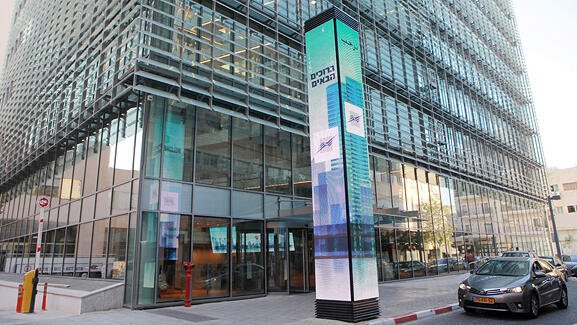Getting your Trinity Audio player ready...
The passing of a bill that restricts judicial oversight over the executive branch as part of the government's judicial reform package has raised concerns among investors over the potential impact on the Israeli economy and fears of a financial crisis.
Read more:
How will the stock market react and why did it see value drop soon after the vote?
It is difficult to predict what will happen in the coming days and weeks, especially since the Supreme Court may still intervene and strike down the bill. However, there is a genuine concern that "unreasonable" actions may be allowed in Israel, causing companies to refrain from investing in the country and possibly reducing their activity. Alongside this, there is also a real concern about economic slowdown and stagnation, and in any case, the impact on the economy is already evident, the question is whether it will intensify.
What is happening now?
In the hi-tech sector, many companies have already prepared themselves in advance for the possibility that certain parts of the judicial reform will come to pass and have withdrawn billions of dollars from Israel in recent months. Now, the protesters who demonstrated on Monday in front of the Knesset in Jerusalem are making it clear that "this was just the beginning," meaning that many more billions could be drawn from Israel abroad in the coming weeks. Official data also indicates that new investments in Israeli hi-tech, mainly from foreign investors, have already decreased by 90% in recent months.
What is the meaning of a significant impact on hi-tech?
The hi-tech sector is a major driver of the Israeli economy. A severe blow to the hi-tech industry, which is already facing a crisis worldwide albeit to a lesser extent, will affect Israel's growth rate, lead to layoffs in the sector and reduce the high revenues from tech-related taxes.
Why would the cancellation of the reasonableness clause drive away foreign companies?
Unreasonable decisions can include almost anything: the government may appoint unfit ministers in various fields, without any possibility of appeal (for example, appointing a person with a criminal record to a senior ministerial position), make sudden new decrees, appoint unskilled managers merely based on political affiliation and continue dissolving existing institutions.
For example?
Ministers are already attempting to abolish the "nivcheret directorim" (pool of qualified candidates) in government companies, disperse the Second Authority for Television and Radio, cancel the Committee for the Status of Women and dissolve the Bar Association. The cancellation of the reasonableness clause will only exacerbate this phenomenon and prevent any intervention by the Supreme Court in decisions.
Will Israel's status in the world be impacted?
Have no doubt about it. Countries and companies tend to avoid investing in non-democratic countries, and worst of all - it is highly likely that credit rating agencies will warn investors in harsh reports that could be published in the coming months (and perhaps even sooner) about what is happening in Israel. These warnings could be accompanied by a clear threat to downgrade Israel's credit rating or at least impact the credit rating forecast, which could lead, in the not-so-distant future, perhaps as early as 2024, to an actual downgrade for the first time in 25 years.
How will such a move affect citizens?
The minute Israel's credit rating decreases, or even just the credit rating forecast declines, interest rates on loans taken by the Israeli government and Israeli companies abroad will rise. The snowball effect will then reach interest rates in Israel, which have already risen significantly over the past 15 months (Bank of Israel's interest rate has increased from 0.1% to 4.75%). The main victims of this situation will be mortgage holders, and some of them may not be able to cope with the higher repayments.
Are there any immediate results that are already evident?
Definitely. On Monday, the stock exchange responded with sharp declines in exchange rates, which may continue in the coming days if there is no swift change in the legislation that has already been approved or an immediate and absolute halt to the judicial reform.
The TA-35 index dropped 2.2% just an hour after the Knesset vote, TA-125 dropped 2.4%, Tel Aviv Finance Index fell 3.5% and the Real Estate stocks dropped by about 4%. More so, government bonds fell by a noticeable rate of 1.8%, and simultaneously, the Israeli shekel significantly weakened: the dollar rate jumped in continuous trading to 3.69 shekels (from a nominal rate of 3.58 shekels), and the euro climbed to a high rate of 4.08 shekels (from a nominal rate of 4.02 shekels).
The Business Forum, which includes the 150 largest companies in the country, went on strike on Monday. Are there more expected strikes in the economy?
It is very possible, but those who stayed behind and essentially became irrelevant during the crucial vote and afterward are the Histadrut (General Organization of Workers in Israel). In the past three days, they have published all sorts of warnings, none of which actually startled the lawmakers. Their leaders are hesitant to act because powerful people in the Likud control several committees and because they claim that some of the employees represented support the judicial reform.
Could the Histadrut strike soon?
It is uncertain. On Monday afternoon, Histadrut Chairman Arnon Bar-David published another statement saying, "I stand behind what I said in recent weeks and clarify that from now on, any unilateral progress on the reform will have severe consequences. I will not allow the rift and polarization in the nation to deepen. Either things will move forward with broad agreement, or they won't move forward at all. In the coming days, I will summon the top institutions of the Histadrut, with the intention of declaring a general labor dispute in the market and implementing it when necessary."




